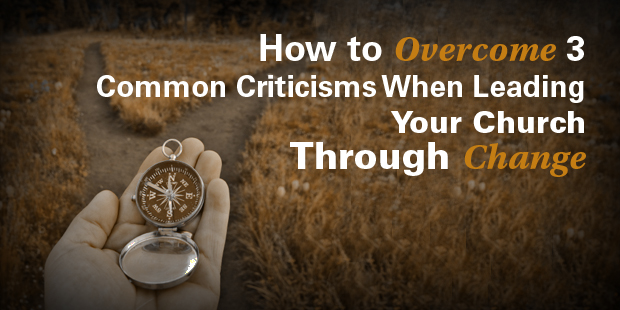
How to Overcome 3 Common Criticisms When Leading Your Church Through Change
There is no growth without change. And there is no change without loss. And there is no loss without pain. A church that wants to grow without going through growing pains is like a woman who says, “I want to have a baby but I don’t want to go through labor.” Is the pain worth it? Yes, it’s worth it. People need the Lord and as long as one person doesn’t know Christ we have to keep reaching out.
As your church begins to grow you’re going to face a lot of different criticisms. But there are three really common ones to prepare for:
1. The care issue.
As your church begins to grow, some of the people who have been around the longest will say, “Pastor, you don’t care about me anymore.” What this really translates as is, “You’re not available to me like you used to be when the church was little.” The truth is, they’re right. You aren’t. The solution to that is not that you double up and work harder.
The solution is small groups. You cannot personally care for everybody’s needs or the church will never grow beyond you. You have to teach people to have their pastoral care needs met in their small group. Growth means restructuring and every time you restructure you disappoint people and the older you get the less you like to do that.
2. The control issue.
When you grow, some people will begin to say things like, “I don’t feel as involved as I used to feel.” Growth upsets the balance of power between the pioneers and the homesteaders. When the scales tip you can expect criticism.
When the church first starts growing everybody goes, “Isn’t this great? Look at all these young people coming in. They can help pay the bills!” Once you have more newcomers than you have established members the question becomes, whose church is it? The answer is that it isn’t their church and it isn’t your church. It’s God’s church.
You can have some measure of growth and some measure of control, but you can’t have a lot of control and a lot of growth at the same time. You have to choose.
3. The comfort issue.
You cannot grow without change and change is never comfortable. A lot of people want the church to grow as long as it doesn’t make them uncomfortable. But if the church is going to continue to grow, we must be willing to minister outside our comfort zone. I’ve seen people in our church who would start a ministry, grow it up, turn it over to a newcomer, then start up another new ministry, grow it up, and turn it over to a newcomer. The real issue is selfishness and it takes unselfish people to grow a church.
So when criticism comes as a result of growth, change, and loss, how does a wise Pastor navigate the relationships that exist in the church? Here are three things you need to do that aren’t easy, but they are often necessary.
1. Be willing to let people leave the church
People are going to leave your church no matter what you do. But when you define the vision, you’re choosing who’s going to leave – those who are supportive of the vision or those who aren’t. You cannot surrender the leadership of your church to manipulators. Jesus invested the maximum time with those who would bear the maximum responsibility.
2. Continually remind people why you’re making these changes.
Why are we doing all this? There is only one reason – people need the Lord. We’re making these changes to reach one more person for Jesus.
3. Affirm and appreciate people for the changes they do agree to make.
Be grateful for minor changes. Focus on progress not perfection. Change is hard, and God uses change to grow people. So affirm growing people who have chosen to embrace change for the sake of the kingdom.
Read more from Rick here.

Tags: Change, Leadership Characteristics, Overcoming Criticism, Rick Warren












